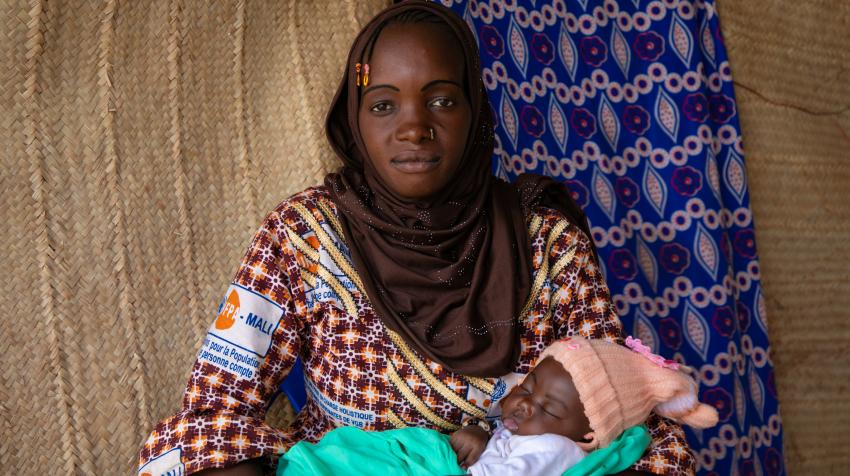From Vol. XLIV, No. 2, "Green Our World!", 2007
The issues of sustainability, particularly climate change and clean energy, as well as energy security and access, are compelling concerns of our times. Through the issues raised by climate change, the goal of sustainable development has been given a tangible core and a renewed sense of urgency.
Climate change, energy and sustainable development are rightly at the top of the priority list for discussion and solution-finding at international forums, both within the United Nations context and beyond. I applaud Secretary-General Ban Ki-moon's focus on this environmental issue, as well as his appointment of three special envoys to facilitate progress in the United Nations negotiations on climate change.
The scientific evidence for climate change is clear. There is a strong message from the Intergovernmental Panel on Climate Change that action is needed to reduce greenhouse gas emissions and to adapt to the changes that climate change will bring. In many cases, taking action makes sense, because of the co-benefits that can accrue, such as reducing soil erosion from planting trees and the health benefits of better insulated housing. What is also clear is that we have many of the tools required to reduce the global greenhouse gas emissions. However, there are still gaps in achieving this goal. Therefore, it is critical that we continue to put efforts into developing low-emission technologies. New Zealand is playing its part, by leading research into reducing emissions from pastoral agriculture and seeking to collaborate with others to advance this. The United Nations Framework Convention on Climate Change came into existence 15 years ago -- one of the three pillars agreed to at the 1992 Earth Summit in Rio de Janeiro. But with the realization that the Convention was not going to deliver the emissions reduction required, the Kyoto Protocol was adopted ten years ago.
The Protocol was the best consolidated effort that countries could produce at the time. It is a great negotiating achievement and has served us well in testing a number of innovative mechanisms. However, with only 33 per cent of the world's emissions covered, it can take us only part of the way towards the Convention's objective of stabilizing the greenhouse gases produced by our economies at a level that is not dangerous for the climate system.
Much has changed in the ten years since Kyoto. We have improved our understanding of climate science and tested the ability of the United Nations framework to deliver results on the ground. Along the way, there have been demonstrable successes and also some areas highlighted for improvement. But our greatest realization is that we cannot succeed in our ultimate task unless we evolve the UN framework further. We cannot afford to let ourselves be stuck in backward-looking negotiations. What is required is a new vision and a new way of working together. We must take the best from current arrangements and add the tools that will allow us to be ambitious, while acknowledging that the solutions we craft must be fair and equitable to all.
What is becoming clear is that countries need to contribute to an international response to climate change in ways that are relevant. In this case, one size will not fit all. At the end of the day, what matters most is the comparability of efforts. All countries must do the best they can to tackle climate change -- in ways that suit their national circumstances. There will be many opportunities for mutual effort and approaches, which we need to seize. It is understandable that given the scale of the global effort required, there will be concerns by countries about the effects on economic growth and by firms on their competitiveness. These valid concerns need to be addressed squarely, but they should not be overestimated. The costs of transitioning to lower carbon economies must be viewed over the long term and against the cost of inaction.
My aspiration is for New Zealand to be the first country to be truly sustainable across the four pillars of the economy, society, the environment and culture. Without a commitment to greater sustainability in our resource use and way of life, we risk not only damaging our own environment, but also exposing New Zealand's economy to significant risk, which is intimately linked to its natural and physical resource base. Addressing the challenge of climate change is a fundamental part of this plan.
We know too that, as a small country, the steps New Zealand takes to reduce emissions will not be sufficient by themselves to change the global outcome. Our country's actions need to be part of a re-energized and effective effort by the international community. I look forward to New Zealand playing its full part in that effort and the process to get there.
The UN Chronicle is not an official record. It is privileged to host senior United Nations officials as well as distinguished contributors from outside the United Nations system whose views are not necessarily those of the United Nations. Similarly, the boundaries and names shown, and the designations used, in maps or articles do not necessarily imply endorsement or acceptance by the United Nations.



